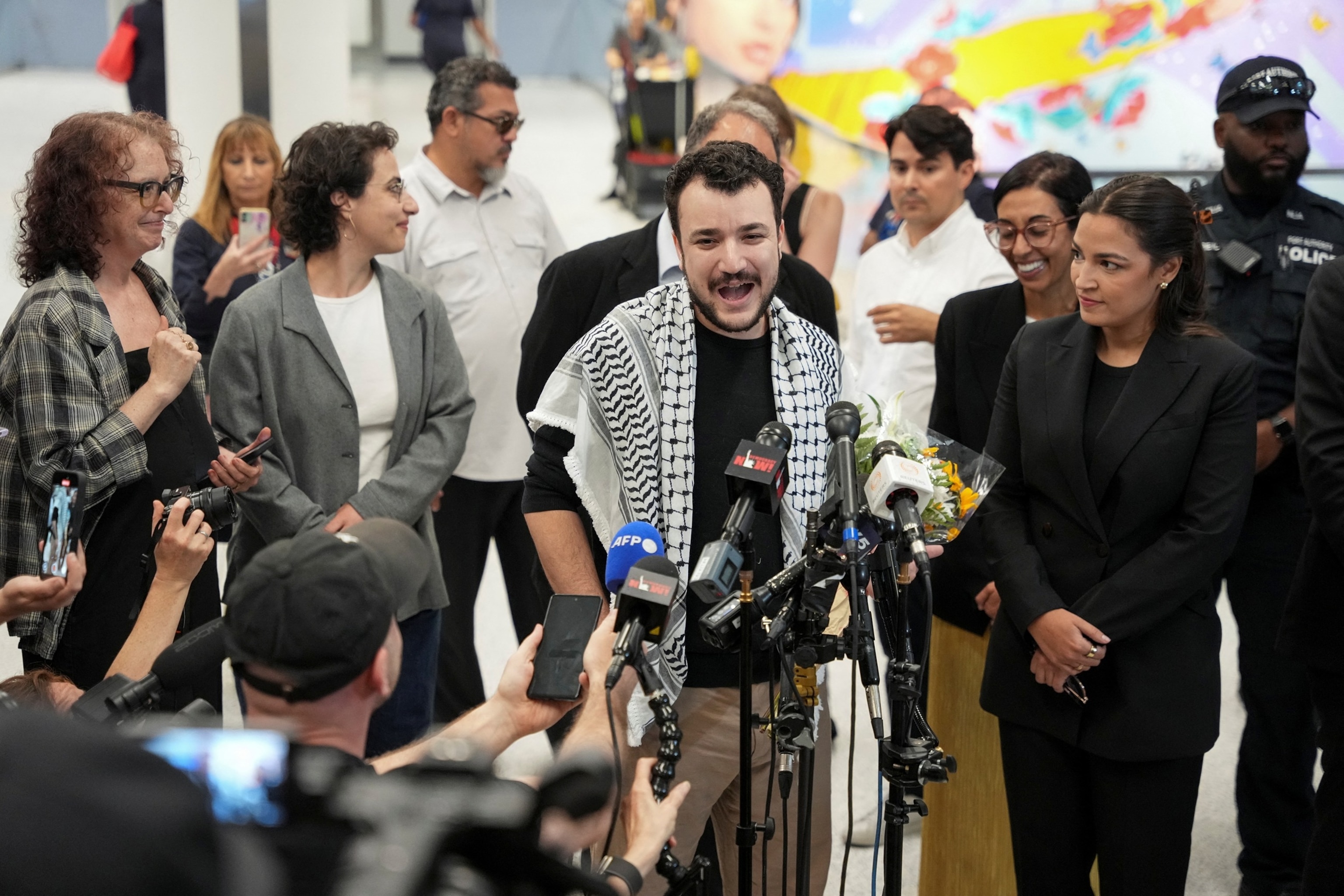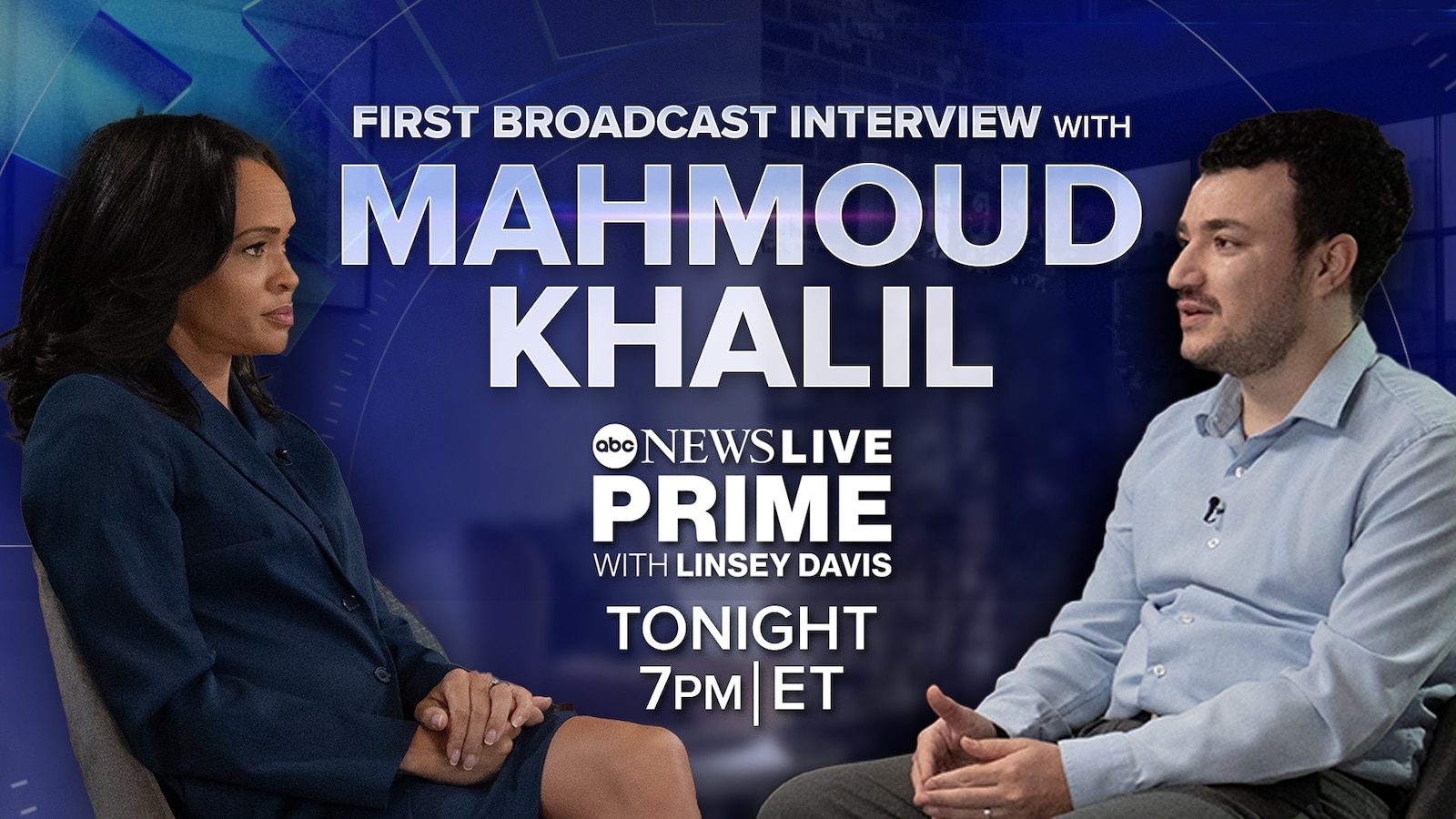Mahmoud Khalil, the Columbia University activist who was detained by Immigration and Customs Enforcement for more than three months, spoke with ABC News Live Prime anchor Linsey Davis about his time in custody and vowed to continue his right for Palestinian human rights in the first broadcast interview since his release on Friday.
Khalil, a green card holder who still faces the threat of deportation under the Trump administration, told Davis in an interview that aired on ABC News Live’s Prime on Monday that despite the lingering threat of renewed detention, he remains undeterred.
“Not any threat would deter me because no one should stay silent when people are getting killed. No one,” said Khalil, who in 2023-2024 helped lead a series of Columbia University protests against the Israeli military campaign in Gaza.
Khalil, 30, was a graduate student at Columbia during the pro-Palestinian movement that erupted on college campuses across the U.S. — one that President Donald Trump vowed to “crush” during his 2024 presidential campaign.
President Donald Trump, during his 2024 presidential campaign, vowed to “crush” the protests because he claimed they were a hotbed of antisemitism.
“If you were to sit down and have a conversation with President Trump, what would you say?” Davis asked Khalil.
“My main message is that [President Trump] vowed that he would set the Palestinian movement in this country 20 years back during his campaign. But what he did to me actually advanced the cause of Palestinian liberation for many years,” Khalil said.

Mahmoud Khalil, the Columbia University pro-Palestinian activist who was detained by ICE for more than three months, spoke with ABC News Live Prime anchor Linsey Davis in the first on-camera interview since his release.
ABC News
Trump last year reportedly told donors at a closed-door meeting during his campaign that he would crush the college protests.
The movement was sparked by the Israel-Hamas war that began on Oct. 7, 2023, with Hamas’ terrorist attack on Israel, where at least 1,200 were killed and 251 were taken hostage. Fifty hostages still remain in Hamas captivity, and an additional 27 believed to be dead, according to Israeli officials.
The war has taken a severe toll on the Palestinian population in Gaza, with 55,104 people killed, according to the Hamas-run Gaza Health Ministry.
“We did not ask that Palestinians should receive special treatment,” Khalil said regarding the demands of the student-led movement. “We literally said we only want justice and equality.’
Who is Mahmoud Khalil?
Khalil, who was detained on March 8 in his New York apartment building, was the first high-profile pro-Palestinian activist to be detained by ICE under the Trump administration. That was followed by the arrest of several other student activists.
“I felt like I was literally kidnapped,” Khalil recalled. “All the ‘know your rights’ that I’ve indulged myself into felt like nothing, because at that moment ICE made it clear that you have no rights whatsoever.”
The grandson of Palestinian refugees, Khalil was born and raised in a small refugee camp in southern Damascus. He became a refugee again in Lebanon during the Syrian civil war and later moved to Algeria, where he has citizenship. Khalil said that he was first accepted into Columbia University in 2020 but had to defer until 2022 due to the COVID-19 pandemic.
He is married to Dr. Noor Abdalla, an American citizen, who gave birth on April 21 to the couple’s first child, a boy named Deen. Khalil’s request to be present for his son’s birth was denied and he did not meet him until May 22 while in custody.
He said that missing his son’s birth was the most difficult part of his detention.
“What did that mean that you were denied that?” Davis asked.
“That’s the most cruel thing that any administration would do,” Khalil said.
Asked what his first night with his son was like after his release, Khalil said that he “couldn’t sleep.”
“[I was] just looking at him, being with him,” he said. “I would be alert to any sort of expression that Deen would make because the moment that was stripped of me, of witnessing his birth, really impacted me on so many levels.”
Why was he detained?
In detaining Khalil — a legal U.S. resident — the Trump administration argued that his continued presence in the country would pose a risk to U.S. foreign policy.
“The White House has said that you distributed pro-Hamas fliers. Secretary Rubio said that you created an environment of harassment toward Jewish students. President Trump said we got to get him the hell out of our country. Why do you think that you are perceived as such a threat?” Davis asked Khalil.
“Because I represent a movement that goes against what this administration is trying to do,” Khalil responded. “They try to portray me as a violent person. They try to portray me as a terrorist, as some lunatic, but not presenting any evidence, not presenting any shred of credibility to their claims.”
When talking about the Palestinian movement, Khalil said there is “no place” for antisemitism or “any form of racism.”
“There’s no place for any form of racism, including anti-Blackness, antisemitism in the Palestine movement, and the Jewish students and people in general in the United States are an integral part of the Palestinian movement,” he said.

Columbia University graduate student Mahmoud Khalil speaks to the press next to Rep. Alexandria Ocasio-Cortez at Newark Liberty International Airport, a day after being released from immigration custody, in Newark, New Jersey, June 21, 2025.
Angelina Katsanis/Reuters
U.S. District Judge Michael Farbiarz issued a preliminary injunction on June 11 barring the Trump administration from continuing to detain him based on the assertion that he’s a threat to national security. But Khalil was detained for an additional week until his release on Friday after the government argued for his continued detention based on their allegation that he misrepresented information on his green card application.
“The Trump administration has said that you made omissions on your green card and misrepresented yourself. Is there any truth to that?” Davis asked.
“Absolutely not,” Khalil said. “They added these allegations a week after my arrest because they knew that their first allegation is also wrong.”
What comes next
Khalil was released on Friday from an Immigration and Customs Enforcement facility in Jena, Louisiana, after Judge Farbiarz issued an order granting his release on bail. The judge said the government made no attempt to prove that Khalil’s release would irreparably harm them in some way or that Khalil represented a flight risk.
“What all that evidence adds up to is a lack of violence, a lack of property destruction, a lack of anything that might be characterized as incitement to violence,” Farbiarz said of Khalil.
The judge said that the conditions of Khalil’s release shall not include electronic monitoring or a requirement that a bond be immediately posted.
The ruling to release Khalil came at the same time an immigration judge in Jena, Louisiana, denied Khalil’s request for asylum and ordered him to remain detained — but Farbiarz’ order superseded that ruling.
The Department of Homeland Security sharply criticized the judge’s decision to release Khalil, saying in a statement on Friday that the ruling is “yet another example of how out-of-control members of the judicial branch are undermining national security,” and arguing “an immigration judge, not a district judge, has the authority to decide if Mr. Khalil should be released or detained.”
“Their conduct not only denies the result of the 2024 election, it also does great harm to our constitutional system by undermining public confidence in the courts,” the statement said.
As his case moves forward, Khalil said that he is “very concerned” about his and family’s safety and said he knows that he could be detained again if the Trump administration’s appeal prevails in federal court.
Reflecting on “a very long fight ahead,” he said that the administration’s threats will not stop him from speaking out.
“[The Trump administration] want to make me an example so that no one would dare to speak about Palestine,” Khalil said. “But it would not stop me from continuing to advocate for what’s right.”
ABC News’ Sabina Ghebremedhin contributed to this report.

